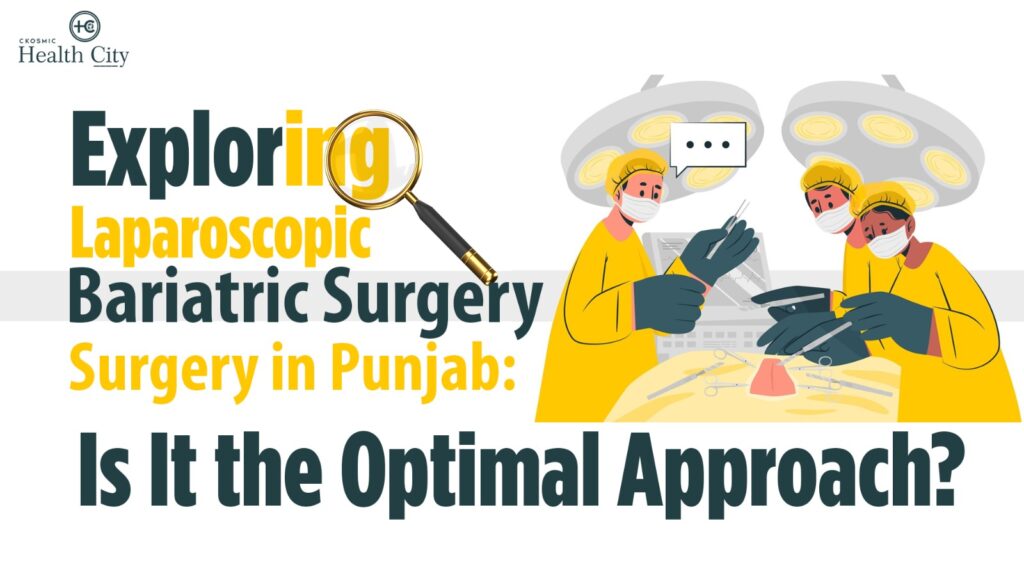Laparoscopic bariatric surgery is one of the most sought-after procedures in Punjab as it helps shed excess weight in a minimally invasive fashion and offers swift recovery. However, as with any medical procedure, finding out whether laparoscopy is truly the best approach for all patients and circumstances is essential. This article explores various aspects of bariatric surgery, the advantages and limitations of laparoscopic techniques, and alternative approaches that cater to individual patient needs.
Understanding Laparoscopic Bariatric Surgery

Laparoscopic bariatric surgery is minimally invasive weight loss surgery, an advanced means of weight loss procedure involving specialized instruments and a miniature camera, known as a laparoscope, to perform surgical interventions through small incisions in the abdomen. With this equipment, surgeons can see the surgical site in high definition, giving them more accuracy and precision when navigating.
After making incisions, the surgeon can insert surgical equipment and perform various steps easily, like rerouting the digestive tract to aid in weight loss or constructing a smaller stomach pouch.
Laparoscopic techniques cause less tissue trauma, reduced blood loss, and minimal scarring. Patients who undergo the procedure recover quickly compared to traditional open surgery. Patients typically experience less postoperative fatigue and can resume their daily routines more swiftly, enhancing patient satisfaction and reducing the overall burden on healthcare resources. For these reasons (among others), the best bariatric surgeons in Punjab primarily prefer laparoscopic techniques.
Advantages of Laparoscopic Bariatric Surgery
The minimally invasive aspect of laparoscopic bariatric surgery, which results in less tissue stress, less scarring, and a lower risk of problems like infections and hernias, is among its primary advantages. Patients also usually feel less pain after surgery and use fewer painkillers, which enhances their general comfort and process satisfaction.
Laparoscopic techniques allow surgeons a clearer view of the surgical field, enhancing their ability to perform procedures with better accuracy and precision. Because laparoscopic bariatric surgery is more precise, there is a lower chance of surgical error and better results, which appeals to both surgeons and patients.
Considerations for Laparoscopic Bariatric Surgery
Considerations for laparoscopic bariatric surgery extend beyond its benefits and encompass various factors influencing its suitability for individual patients. One crucial aspect is finding out if there are any obesity-related comorbidities, such as diabetes, hypertension, or sleep apnea. Laparoscopic techniques are ordinarily safe and effective for patients with these conditions, but certain medical complexities may require additional safety measures or alternative approaches.
Anatomical variations among patients also play a significant role in determining the feasibility of laparoscopic bariatric surgery. Factors such as abdominal adhesions, enlarged organs, or unusual anatomical structures can pose challenges during laparoscopic procedures. In such cases, the surgeon usually exercises caution or opts for alternative surgical techniques to ensure the safety and success of the operation.
A thorough assessment of the patient’s medical background, covering any prior abdominal procedures, is necessary when considering laparoscopic bariatric surgery. Adhesions or scar tissue from previous procedures can obscure the surgical field and increase the risk of complications during laparoscopic interventions.
Alternative Approaches to Bariatric Surgery
Some alternative approaches to bariatric surgery can serve as valuable options for patients who may not be suitable candidates for laparoscopic procedures or who require specialized techniques to address specific anatomical challenges. Open surgery, despite its more invasive nature, remains a viable option for select patients with complex medical histories or anatomical considerations.
Where laparoscopic surgery is less than ideal because of factors such as extensive adhesions from prior abdominal surgeries or significant anatomical variations, open surgery may be one of the preferred approaches. By making a larger incision in the abdomen, surgeons gain better access to the surgical site, allowing for greater visibility and manoeuvrability to navigate challenging anatomical structures safely.
Another alternative to traditional laparoscopic bariatric surgery is robotic-assisted surgery, which harnesses advanced robotic technology to augment the surgeon’s capabilities during the procedure. Robotic systems can offer enhanced visualization, precision, and proficiency, enabling surgeons to perform intricate manoeuvres more accurately, and this approach is quite beneficial for patients with complex anatomical considerations or those requiring precise suturing techniques.
While both open surgery and robotic-assisted techniques offer distinct advantages in specific scenarios, they also come with their own set of considerations and potential drawbacks. Open surgery typically involves longer recovery times and increased postoperative pain compared to laparoscopic procedures. Similarly, robotic-assisted surgery may require specialized training and equipment, potentially leading to higher procedural costs.
Laparoscopic Surgery, or Not: The Verdict!
After exploring alternative approaches to bariatric surgery, focus on finding what’s best for you. You can begin by considering factors such as your medical history, individual health needs, and personal preferences and research different bariatric procedures and their potential benefits and risks. Discuss your options with your primary care physician or one of the best bariatric surgeons in Punjab to gain insights into which procedure aligns best with your health goals.
Prioritize consultation with the best bariatric surgeon in Punjab to evaluate your candidacy and explore the most suitable options for your unique circumstances. By taking a comprehensive approach and considering various aspects, you can make an informed decision that sets you on the path to successful weight loss and improved health.
Choosing the Best Bariatric Surgeon in Punjab
When considering bariatric surgery, selecting the best bariatric surgeon in Punjab is paramount to ensuring optimal outcomes and patient safety. A skilled and experienced surgeon with expertise in laparoscopic techniques can assess each patient’s unique needs and recommend the most appropriate approach for their specific circumstances.
Choosing the Best Bariatric Surgeon in Punjab is a critical step towards successful weight loss surgery. It involves thorough research and consideration to ensure that you entrust your health to a qualified and experienced professional. The best bariatric surgeon in Punjab should possess a combination of expertise, experience, and a track record of successful outcomes. It’s essential to look for a surgeon who specializes in bariatric surgery and has extensive experience performing a wide range of procedures. Also, consider the surgeon’s credentials, training, and patient satisfaction rates.
By seeking services from the best bariatric surgeon in Punjab, you ensure high-quality care to achieve your weight loss goals safely and effectively.
At The End
Laparoscopic bariatric surgery offers advantages such as reduced invasiveness, faster recovery times, and improved patient outcomes. However, evaluate your unique needs and circumstances to determine whether laparoscopy is the right choice.
Dr Amit Sood, renowned as the best bariatric surgeon in Punjab, is one of the leading surgical experts in the country. Along with a dedicated, multidisciplinary team, Dr Amit Sood offers comprehensive weight loss solutions in multiple locations throughout Punjab. With the guidance of the best bariatric surgeon in Punjab, patients can explore alternative techniques when necessary and make informed decisions about their treatment options.

